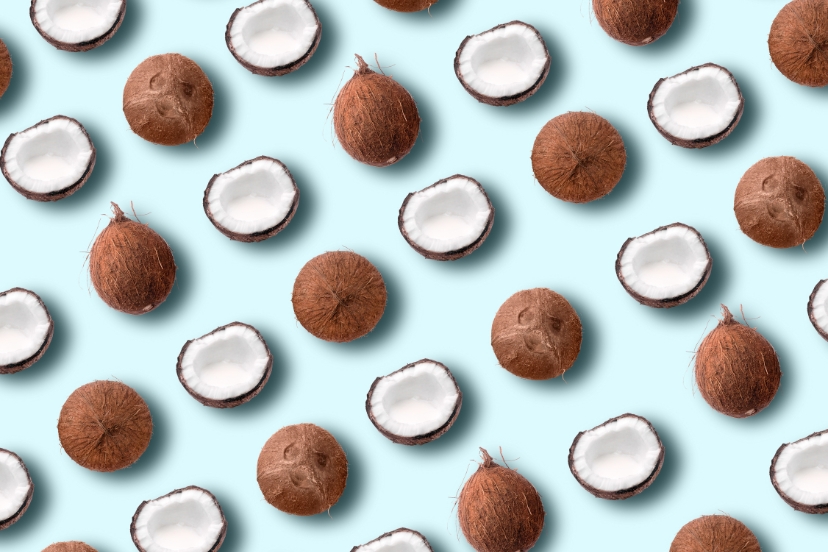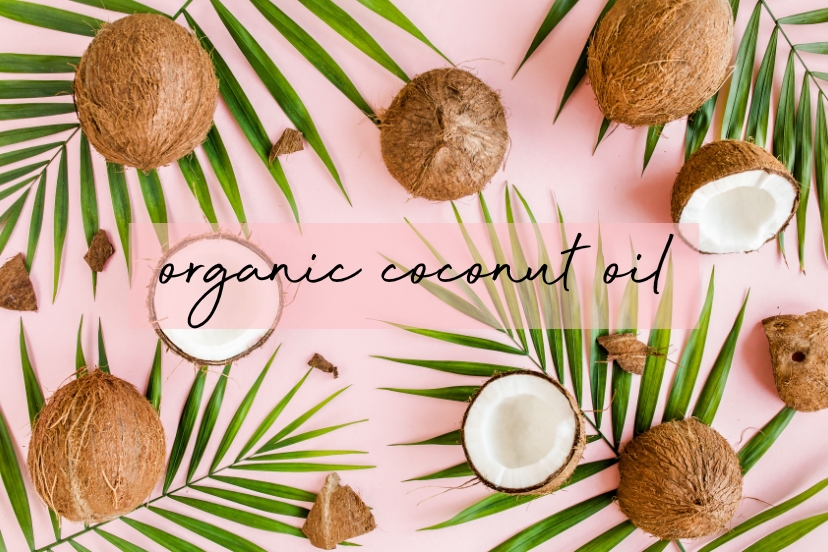Organic beauty Ingredients: Coconut Oil
Hi there, I’m thrilled to bring you along on a tropical journey into the world of organic beauty ingredients today. We’re exploring a true gift from nature – Coconut Oil. Prepare to unveil the magic and wonder of this amazing ingredient!
Diving straight in, coconut oil has roots that stretch deep into the history and soil of tropical countries. This golden oil has been used for centuries in beauty routines in places like the Philippines, Sri Lanka, and India.
The coconut palm is fondly referred to as the “Tree of Life,” and trust me, it’s a name well-deserved!
Obtaining the oil | Cold pressed
Now, you might be curious about how we get this precious oil from the coconut tree to our beauty cabinets. It’s quite an adventure!
Coconut oil comes from mature coconuts that are harvested and husked to reveal the white “meat.” This meat is then cold-pressed to extract the oil, maintaining all the natural nutrients and antioxidants.
It’s truly a process of love and care! Cold pressing is a method of extracting oil from oilseeds, fruits (like olives or coconuts), and nuts without using heat or chemical solvents. This extraction method involves literally pressing the plant material until it releases its oil. It’s a purely physical process that doesn’t involve high temperatures or harsh chemicals.
Why is cold pressing a superior method?
There are several reasons…
Preservation of Nutrients:
Heat can degrade certain nutrients and antioxidants in the oil. Cold pressing, as the name implies, avoids high temperatures, preserving the oil’s natural, healthful qualities.
This is especially important when the oil is being used for health and beauty applications, where nutrient content can have a significant impact on the results.
Avoiding Harmful Substances:
Many other methods of oil extraction use chemical solvents to help release the oil. These solvents can leave behind trace residues that you probably don’t want on your skin or in your body. Cold pressing avoids this issue altogether.
Taste and Aroma:
This might not be as relevant for beauty applications, but when used in food, cold-pressed oils retain more of their original flavor and aroma compared to oils extracted with heat. This could be a plus for DIY beauty recipes where smell is an important part of the experience!
In summary, cold-pressed coconut oil is pure, natural, and rich in nutrients, making it an awesome choice for your beauty needs.
What exactly makes organic coconut oil such a superstar in beauty?
Let’s dive into its nutritional profile. Coconut oil is an absolute powerhouse of essential fatty acids like lauric and myristic acid, vitamins E and K, and minerals like iron. But did you know, and here’s a curious fact, coconut oil is one of the few plant sources rich in saturated fats.
That’s right! The same kind of fats that are found in our skin sebum, making it a wonderful natural moisturizer!
So, what does this mean for your skin and hair?
I’ve got five amazing benefits that will make you fall in love with coconut oil.
1. Its deep moisturizing ability helps hydrate your skin and reduce water loss.
2. Its antibacterial nature can help combat skin infections.
3. It aids in wound healing – your minor cuts and scrapes will definitely appreciate a touch of coconut oil!
4. It helps reduce inflammation, making it an ally against conditions like acne or eczema.
5. Its antioxidants fight off free radicals, helping you maintain youthful, radiant skin.

Now…let’s consider a few possible drawbacks
1. Coconut oil is comedogenic, which means it can clog pores and cause breakouts if you have oily or acne-prone skin.
2. If you’re allergic to nuts, you might have to give it a pass.
3. Some people don’t appreciate its greasy feel.
Comedogenicity
Speaking of comedogenicity, coconut oil scores 4 out of 5 on the scale. This makes it a not-so-great choice for those with oily skin, but if you have dry or normal skin, coconut oil can be a skin-savior!
The beauty of coconut oil truly shines when it’s organic. Non-organic coconut oil might have been exposed to pesticides or harsh refining methods that strip away its natural goodness. In contrast, organic coconut oil is pure, unadulterated, and retains all its natural nutrients. I promise, your skin can tell the difference!
Now, let’s have some fun! Here’s an easy DIY face mask recipe using high quality organic coconut oil
All you need to do is mix organic coconut oil (I like this one), a dollop of honey, and a hint of lemon juice.
Apply this mask to your face, wait for 15 minutes, then rinse it off. Voila!
Your skin will feel nourished and will have a lovely glow.This simple, yet powerful, mask is a combination of three fantastic natural ingredients – coconut oil, honey, and lemon juice.
Let’s break down the role each of them plays:
Coconut Oil
– As we’ve discussed, coconut oil is a moisturizing superstar! It hydrates and nourishes your skin, helping to maintain a healthy, vibrant glow. It is rich in fatty acids that mimic the skin’s natural sebum, making it a great option for restoring moisture to dry and parched skin. It also has some antimicrobial properties, which may help with minor skin irritations or acne.
Honey
– Honey isn’t just delicious, it’s also a natural humectant. That means it attracts and holds onto water molecules, which helps keep your skin hydrated and plump. Its anti-inflammatory and antibacterial properties can calm redness and fight off acne-causing bacteria.
Honey is also packed with antioxidants that protect and repair the skin from damage, maintaining its youthful appearance.
Lemon Juice
– Lemon juice contains citric acid(link to my vid on citric acid), a type of alpha hydroxy acid (AHA) that can help exfoliate the skin, removing dead skin cells and revealing the brighter, fresher skin underneath. This contributes to the “glow” effect after using the mask. It’s also rich in Vitamin C, a potent antioxidant that can boost collagen production, helping to keep your skin looking firm and youthful.
Together, these ingredients create a mask that hydrates, soothes, exfoliates, and brightens your skin.
The result?
A beautiful, natural glow that’s sure to turn heads! However, do remember that lemon juice can make your skin more sensitive to sunlight, so be sure to apply sunscreen if you’re planning to be outside after using this mask.
To wrap it up, organic coconut oil is an incredible ingredient to include in your beauty routine. Its numerous benefits, when used correctly, can enhance your skin and hair’s natural beauty. But remember, everyone’s skin is different, so it’s essential to find what works best for you.
FAQs
– How often should I use coconut oil on my skin?
This can vary depending on your skin type. If you have dry skin, you might benefit from daily use, whereas those with oily skin might want to limit usage.
– Can coconut oil help with skin aging?
Well it has antioxidant properties so it can help reduce the appearance of fine lines and wrinkles, but it should be used as part of a balanced skincare routine.
– Does coconut oil help with skin diseases like eczema or psoriasis?
While coconut oil can help soothe dry and inflamed skin, it’s not a cure. Always check with your Dr.!
– Can I use coconut oil as a makeup remover?
Yes, coconut oil can effectively break down even waterproof makeup due to its oily nature. Just remember to rinse your face well afterwards.
– Can I use coconut oil on my hair?
Yes, it’s an excellent conditioner and can help fight dandruff. Plus, it leaves your hair shiny and soft! Warning! Coconut oil is widely recognized as a versatile and beneficial hair care product. It can nourish dry strands, reduce hair breakage, promote scalp health, and even fight off dandruff. However, while it has its advantages, it might not be suitable for everyone.
Using coconut oil on your scalp could potentially cause problems for certain individuals, especially those prone to oily scalp and acne. That’s because coconut oil is comedogenic, meaning it can clog pores. When applied to the scalp, it could potentially lead to blocked hair follicles, resulting in scalp acne or folliculitis a.k.a inflammation of the hair follicles.









